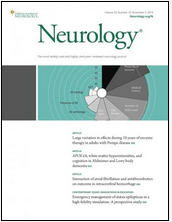 This study amied to define the clinical phenotype of dermatomyositis (DM) with anti-Mi2 autoantibodies.
This study amied to define the clinical phenotype of dermatomyositis (DM) with anti-Mi2 autoantibodies.
In this longitudinal cohort study, the prevalence and severity of clinical features at disease onset and during follow-up in patients with anti-Mi2-positive DM were compared to patients with anti-Mi2-negative DM, antisynthetase syndrome (AS), and immune-mediated necrotizing myopathy (IMNM). Longitudinal anti-Mi2 autoantibody titers were assessed.
A total of 58 patients with anti-Mi2-positive DM, 143 patients with anti-Mi2-negative DM, 162 patients with AS, and 170 patients with IMNM were included. Among patients with anti-Mi2-positive DM, muscle weakness was present in 60% at disease onset and occurred in 98% during longitudinal follow-up; fewer patients with anti-Mi2-negative DM developed weakness (85%; p = 0.008). Patients with anti-Mi2-positive DM were weaker and had higher creatine kinase (CK) levels than patients with anti-Mi2-negative DM or patients with AS. Muscle biopsies from patients with anti-Mi2-positive DM had prominent necrosis. Anti-Mi2 autoantibody levels correlated with CK levels and strength (p < 0.001). With treatment, most patients with anti-Mi2-positive DM had improved strength and CK levels; among 10 with multiple serum samples collected over 4 or more years, anti-Mi2 autoantibody titers declined in all and normalized in 3, 2 of whom stopped immunosuppressant treatment and never relapsed. Patients with anti-Mi2-positive DM had less calcinosis (9% vs 28%; p = 0.003), interstitial lung disease (5% vs 16%; p = 0.04), and fever (7% vs 21%; p = 0.02) than did patients with anti-Mi2-negative DM.
Patients with anti-Mi2-positive DM have more severe muscle disease than patients with anti-Mi2-negative DM or patients with AS. Anti-Mi2 autoantibody levels correlate with disease severity and may normalize in patients who enter remission.
